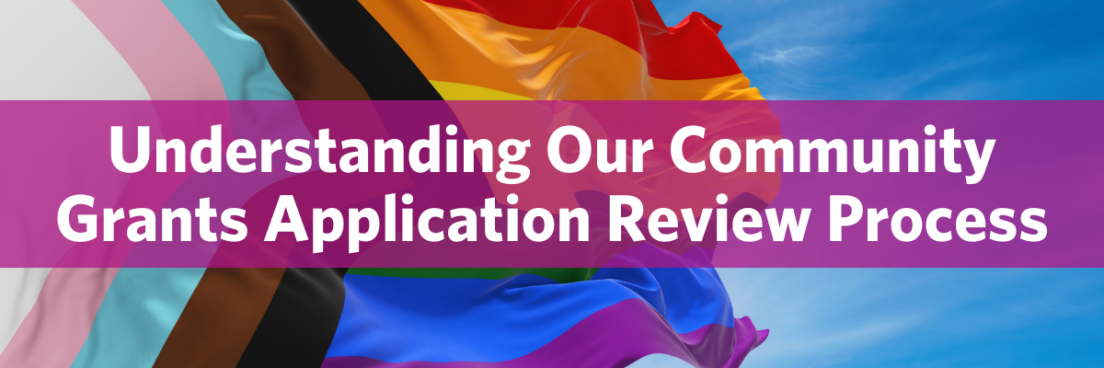Para leer en español, haga clic aquí.
For decades, community groups and nonprofit organizations across the Northwest have worked tirelessly to advance equity and justice for LGBTQ+ communities. At Pride Foundation, we’re proud to support this vital work through our Community Grants Program, which provides consistent, long-term funding to organizations making a difference in every corner of our region.
This year, we’re implementing both a proactive grantmaking model and an open application process. This dual approach ensures that all organizations, whether familiar or new to us, have the opportunity to access funding.
As we approach our 2024 grant cycle, we want to shed light on our application review process to help potential applicants prepare. Our goal is to ensure transparency and clarity, allowing all eligible organizations the best chance to receive funding. While we can’t fund every applicant, our aim is to move resources to roughly 85 grantees collectively across both our open application and proactive grantmaking, with the average grant award of $10,000.
Eligibility Criteria
To be eligible for funding, organizations must meet the following criteria:
- Nonprofit Status: Organizations must have 501(c)(3) status or fiscal sponsorship.
- Location: Organizations must be based in one of the following states: Alaska, Idaho, Montana, Oregon, or Washington.
Who We Fund: Priority Areas
We prioritize funding for LGBTQ+ organizations, and we welcome applications from any group with programs that support LGBTQ+ communities. We prioritize organizations that are:
- Serving BIPOC and TGNC Communities: Organizations should serve Black, Indigenous, and other People of Color (BIPOC) and Trans and Gender Nonconforming (TGNC) folks, with leadership that reflects these communities. Leadership includes positions with decision-making power, such as Directors or Executive Directors, and extends to participation among staff and community members.
- Innovative and Grassroots Organizations: We prioritize organizations, especially smaller, grassroots ones that creatively support their communities where other resources may not be available. This includes rural organizations with limited access to mainstream funding, as well as those led by queer and trans BIPOC working from an intersectional perspective.
What We Fund: Priority Issues
Our funding focuses on the following areas:
- Health and Wellness: This includes organizations providing health services, HIV/AIDS prevention, mental health support, gender-affirming care, and health education. We also consider organizations addressing broader well-being, such as housing services and food security.
- Education: We support organizations focused on gender and racial justice education, as well as youth-serving and youth-led groups.
- Community Building: We fund organizations working to create safe spaces, foster cultural belonging, and support vulnerable populations, including immigrants, formerly incarcerated individuals, sex workers, and those who are unhoused. Additionally, we support efforts to end discrimination and violence against LGBTQ+ people.
How We Evaluate Applications
Our evaluation process for Community Grants is designed to be thorough and equitable. Our community grants team evaluates each application based on a rubric consisting of two parts: Organizational Alignment and a Qualitative Review.
Organizational Alignment: a series of five questions with a possible score of 0-3. The questions include:
- Is this organization TGNC-led?
- Does this organization primarily focus on and serve TGNC?
- Is this organization BIPOC-led?
- Does this organization primarily focus on and serve BIPOC?
- Does this organization work in rural areas?
0= No; 1= somewhat; 2= mostly; 3= yes. The maximum score an applicant can receive for this section is 15.
Qualitative Review: a series of seven questions that evaluate how well an applicant aligns with Pride Foundation’s funding priorities and priority issues. A score of 0-4 is given based on the answers to these questions.
- What is the organization’s mission?
- Does the organization focus on any of these priorities? (Circle/Highlight all that apply): Health and Wellness, Education, Community Building
- What populations does this organization primarily serve (beyond TGNC and BIPOC, if any)?
- What type of work does this organization do? (What are their programs, activities, etc.)
- How is the organization committed to racial equity and justice?
- Any other considerations? (i.e. Budget or location)
- Overall, do you recommend this organization for funding? (Circle/Highlight)
0= no; 1= leaning towards no; 2= maybe; 3= leaning towards yes; 4= yes. The maximum score an applicant can receive for this section is 4. This qualitative review allows for a more holistic and contextual understanding of the organization and their overall alignment with Pride Foundation’s funding priorities and issues.
The Community Grants team then combines the scores from each part for a total numerical score:
- 0-8 points: No
- 9-14 points: Needs Further Consideration
- 15-19 points: Yes
Values & Ethics Statement
The 2024 cycle of our Community Grants will be carefully reviewed and determined by our small but highly experienced grants team, consisting of the Grants Program Officer and the Director of Programs, with consultation from Pride Foundation’s CEO. We acknowledge that placing decision-making in a few hands is a significant responsibility, and we want to affirm that our team brings a wealth of experience, connection, and a strong commitment to equity and justice, honed through years of work within our community.
Our decision-making is guided by the principles of care, trust, and collaboration; growth, learning, and innovation; and integrity, accountability, courage, and transparency.
A fair and inclusive application review process is crucial and we’re continually reflecting, evaluating, and adapting our approach to ensure that it meets the needs of our diverse community.
